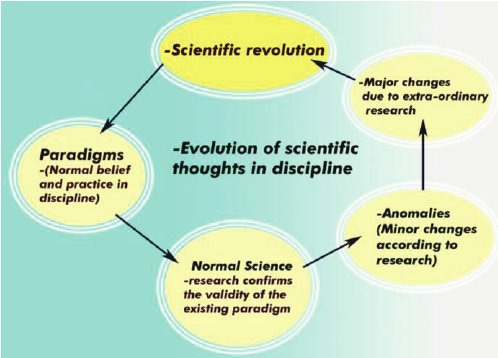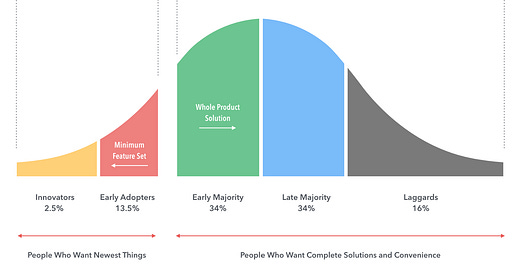I was in a meeting this week where Lynn Rasmussen casually stated that we systems scientists and general systems theorists are “early adopters.”
I’m very familiar with this term in the context of technology. I’ve been an early adopter of various technologies since childhood, from pre-iPod Rio Mp3 players in 2000 to Bitcoin in early 2012.
After discovering Geoffrey Moore’s model for explaining how cultures adopt (or fail to adopt) novel technologies around 2015, I’ve consistently considered the nature of early adoption as it applies to various tech systems.
But I had never considered how it might apply in the context of systems research. What exactly does it mean to be an early adopter of systems science?
Are we vanguards, riding the crest of a Kuhnian scientific revolution still in its formative stages?

If we are early adopters, does it mean that we need to approach education, communication, and fundraising in a way that is fundamentally different from scientists who aren’t operating in a systems paradigm?
Just some food for thought.





Interesting exploration, but with a careful clarification to be noted. ALL "scientists' .. actually all humans .. all living organisms ... (some might say: 'even pre-animates') are already "OPERATING in a systems paradigm". By universal default ... that is the nature of existence. Everything "operates" AS ... complications of integrated systems relations - always and through all times. **** The distinction is a 2nd vs 1st order cybernetics one: Performance "knowing" (of alternative systems relations) is involved and where sentiently chosen novel behaviors --rather than-- autonomic ones instinctively acted out automatically .. are now on the table. **** Approaching education, communication et al. in a different way is an option ... and an obligation! ... if there is belief and knowledge~trust in the novel comprehensions '.. and the desire to change human collective behaviors globally to take advantage of the novel is evaluated as "good" and eventually ... "beneficial" -better informed- then real actions on alertly aware decision options expandingly available .. IS the acting out of "early adoption~adaptation". **** The 'novelty' could be new actions~responses OR different combinant percentages of known actions, and/or timing of options taken. [[ For example - this has happened in recent decades in apian (bees) behaviors. Not consciously but as a metabolic evolution. The "killer bee" variety which came out of South America is successfully out competing the docile varieties depended on to fertilize economically critical human food crops. How? ... because their Queen Bee matures a full day or two earlier than the docile variety. Multiple Queens are produced in a single 'generation' with special hive jelly. The first one to emerge "claims" the status by going to other not-hatched queens and stabbing them, killing them in their molting cells. In hives where mixed types co-mature, the "tie" goes to the "EARLY ADOPTERS" of a novel behavior option. ]] *** SO, yes, novel "opportunities" behaviors .. if deem beneficial .... by metabolic fact or conceptual evaluation ... require some real actions and behaviors which weight the outcome to the "novel adapted (morphed)" SYSTEM. :-) Jamie